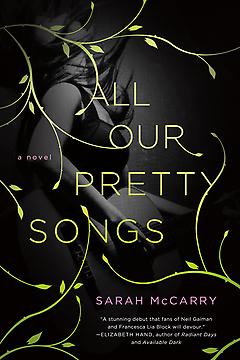Sarah McCarry’s All Our Pretty Songs is another member of this year’s James Tiptree Jr. Award Honor List. (I previously wrote about Tiptree honoree The Golem and the Djinni.) Only a little over two hundred pages long, this is a short, beautiful novel—and one about which I can say very little without spoiling the quiet inevitability of its development and ending.
So if you haven’t read it, and you want to read it pristine and spoiler-free, look away now. (You can read an excerpt from the novel here on Tor.com in the meantime.)
All Our Pretty Songs is a re-imagining of Orpheus and Eurydice, of Janet and Tam Lin: or not precisely a re-imagining, but a novel in which the myths and imagery of those stories lie so close to the surface, woven so deeply into the narrative, that it is impossible for me to read All Our Pretty Songs without feeling the influence of the singer who failed to bring his wife out from Hades, and the woman who held her ain true love at the crossroads and saved him from the tithe to hell.
But All Our Pretty Songs takes folktale and legend and creates from them something of its own. For it is not husband or lover who dares the path to hell, here, and not romantic love that spurs the attempt at rescue. Instead it’s friendship, sisterhood: a deep, protective love.
Our narrator is never named. We know her gender because she talks of herself as a sister and as a girl. She tells us: “I am not beautiful at all, but I am mean… People keep away from my fists in the pit at shows.” Her best friend is Aurora, daughter of a dead rockstar father and an addict mother, rich and wild, “and if you think right now of the most beautiful girl you know, Aurora next to that girl is a galaxy dwarfing an ordinary sun.” They have grown up together. And then into their lives comes the musician Jack, gifted and magnetic and with whom the narrator falls instantly in love; and the man called Minos, who offers Aurora something she has always desired.
The flap copy is misleading about Jack: it suggests he comes between them. But it’s not Jack who comes between our narrator and Aurora so much as it is the world he’s moving towards, drawn to it by the power of his music: a world deeper and older and stranger and less forgiving than the world our narrator knows, and she can’t hold him back from it. She can’t hold Aurora back, either.
She can try to bring her sister up out of hell—but you can’t save someone who doesn’t want to be saved. If it’s even saving, when they’ve made their own choices, when they decide to stay.
All Our Pretty Songs is a book about being young and growing up, about friendship and family, about loving and letting go. Its prose has almost liquid, lyrical qualities: it alternates between the plain and quotidian and passages that blur the line between poetry and prose. The passages that bring the mythic and frightening into the narrator’s world are extremely well-done, cast in the light of drunken hallucination—fever-dream, bad trip—but with an undertone of deep, true menace. The stories that McCarry hints at in the cracks of her narrative—the friendship between Aurora’s and the narrator’s mothers, now broken; Raoul, the narrator’s friend from her job; Jack’s implied history—are fascinating, and flesh out a full, rich world beyond the narrator’s immediate vicinity and her focus on Aurora and Jack.
It is, on the whole, a brilliant book—and this is McCarry’s debut. That’s pretty stunning all on its own.
Liz Bourke is a cranky person who reads books. Her blog. Her Twitter.










